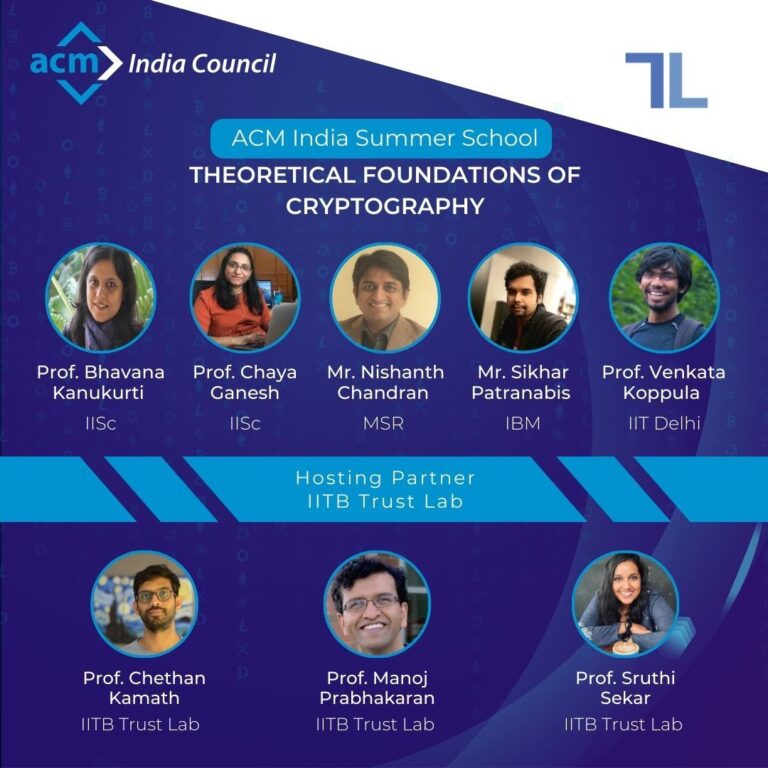Theoretical Foundations of Cryptography
Hosted by

The Trust Lab, in collaboration with ACM India, is organizing a summer school on “Theoretical Foundations of Cryptography” from June 3rd to June 13th at the Indian Institute of Technology Bombay (IITB).
ACM India summer schools offer self-motivated students in-depth knowledge and exposure to research in current, advanced technology areas. Each of the 6 schools in this stellar line up covers academic and applied research in the technology topic, and is taught by the best-in-class experts from academia and industry.
Each day will comprise lectures as well as tutorial sessions with hands-on problem solving experience. Toward the end of the school, there will be a session focused on career options in the area covered by the school.
Top performing students in these schools may earn opportunities for internship in industry and will be invited to an all-expense-paid trip to the ACM India ARCS Symposium and ACM India Annual Event in February 2025.
Topics to be covered
Basic tools: Information theoretic tools (basics of Information theory, secret sharing, randomness extractors) and computational tools (PRGs, computational indistinguishability, concrete computational assumptions).
Secure communication: Foundations of symmetric-key (block ciphers, modes of operation, MAC, hashes) and public-key (key-exchange, public-key encryption, signatures) cryptography.
Proof Systems: Zero-Knowledge proofs, SNARKs
Cryptography for Blockchains (other than proof systems): Merkle trees, Verifiable Random Functions, Verifiable Delay Functions.
Secure Multi-party Computation: Some classical constructions (Yao’s garbled circuits, BGW protocol, GMW protocol, CDN protocol) and more recent ones with practical implementations.
Other Advanced Primitives: Fully-Homomorphic Encryption, Functional Encryption, Obfuscation, etc.

Presentations
Day 1
Introduction to Cryptography – Information Theoretic Crypto by Dr. Nishanth Chandran
This session presents an overview of works that have been instrumental in taking MPC from theory to practice, with a specific focus on MPC in the context of machine learning.
Nishanth Chandran is a Principal Researcher at Microsoft Research India. His research interests are in cryptography in general and secure computation in particular. Prior to joining MSRI, Nishanth was a Researcher at AT&T Labs, and before that he was a Post-doctoral Researcher at MSR Redmond. Nishanth is a recipient of the 2010 Chorafas Award for exceptional achievements in research and his research has received coverage in science journals and in the media at venues such as Nature and MIT Technological Review. He has published several papers in top computer science conferences such as Crypto, Eurocrypt, IEEE S&P, CCS, STOC, FOCS, and so on. His work on position-based cryptography was selected as one of the top 3 works and invited to QIP 2011 as a plenary talk. Nishanth has served on the technical program committee of all the top cryptography conferences on several occasions and holds several US/International patents. Nishanth received his Ph.D. in Computer Science from UCLA, M.S. in Computer Science from UCLA, and B.E. in Computer Science and Engineering from Anna University (Hindustan College of Engineering), Chennai. Nishanth is also a top ranking (A grade) All India Radio South Indian Classical (Carnatic) Violinist and performs regularly at international venues such as the Madras Music Academy Chennai, Nita Mukesh Ambani Cultural Centre Mumbai, and Hollywood Bowl Los Angeles.
Day 2
Basics information theoretic tools II (Information theoretic MAC, Randomness extractors) by Prof. Sruthi Sekar
Sruthi Sekar is a faculty member of the Computer Science and Engineering (CSE) Department, IIT Bombay. She is part of the Theory Group and Trust Lab at IITB. Prior to joining Trust Lab in April 2024, Sruthi Sekar was a post-doctoral researcher at UC Berkeley, hosted by Sanjam Garg. She did her doctoral research at Indian Institute of Science under the supervision of Bhavana Kanukurthi and Manjunath Krishnapur. Her research interest lies in Cryptography and other related areas in Theoretical Computer Science.
Introduction to Symmetric-Key Cryptography (Part-1; Basics of SKE and modes of operation, MAC and hash functions) by Dr. Sikhar Patranabhis (IBM Research)
This session will cover some basic computational tools for cryptography, as well some topics in symmetric-key cryptography. The session will be broadly divided into three parts. The first part will present an overview of pseudorandom generators (PRGs), pseudorandom permutations (PRPs), stream ciphers, and block ciphers. The second part will cover pseudorandom functions (PRFs), symmetric-key encryption, and block cipher modes of operation. The final part will cover MACs and authenticated encryption. Each part will have associated group homework questions, and a tutorial session at the end of the session.
Sikhar Patranabis is a staff research scientist at IBM Research India. His research interests are in theoretical and applied cryptography, with recent focus on quantum-safe cryptography and privacy-preserving analytics. Prior to joining IBM, he was a staff researcher at VISA Research, USA and a postdoctoral researcher at ETH Zurich, Switzerland. He received his B.Tech and PhD from IIT Kharagpur. He is a young associate of the Indian National Academy of Engineering (INAE), an ACM India eminent speaker, and the recipient of the President of India gold medal from IIT Kharagpur. His research has appeared in top conferences and journals in security and cryptography (including JoC, Crypto, Eurocrypt, ACM CCS, IEEE S&P, NDSS), and has been recognized by an IACR best early career paper award at Asiacrypt, an IBM PhD fellowship, and a Qualcomm Research Innovation Fellowship. Outside of work, he is an ardent lover of music, cinema, and cricket.
Day 3
Introduction to Symmetric-Key Cryptography (Part-2) by Dr. Sikhar Patranabis
Introduction to Symmetric-Key Cryptography (Part-3) by Dr. Sikhar Patranabis
Introduction to Symmetric-Key Cryptography (Part-4) by Dr. Sikhar Patranabis
Day 4
Public Key Encryption I by Prof. Sruthi Sekar
Public Key Encryption II by Prof. Sruthi Sekar
Secure communication II by Prof. Chetan Kamath
Day 5
Introduction to fully-homomorphic encryption by Prof. Chetan Kamath
Instructions for FHE lab session by Mr. Archisman Dutta
Slides from the FHE lab session by Mr. Archisman Dutta
Day 6
Practical proof systems by Prof. Saravanan Vijayakumaran
Proof systems (Zero-knowledge proofs and SNARKs) by Prof. Chaya Ganesh.
Day 7
Basics of secure multi-party computation by Prof. Manoj Prabhakaran.
Day 8
Applied MPC by Dr. Nishanth Chandran (MSR)
Applied MPC by Dr. Nishanth Chandran (MSR)
Day 9
| Day 1 | |||||
| Date | Duration | Time From | Time To | Morning Session | Key Resource Person |
03/06/2024 | 1.5h | 09.30 AM | 11.00 AM | Basics information theoretic tools I (Perfect encryption and its limitations, secret sharing etc) | Nishanth Chandran (MSR) |
| 15m | Tea Break | ||||
| 1.5h | 11.15 AM | 12.45 PM | |||
| 1.15h | 12.45 PM | 02.00 PM | Lunch Break | ||
| 1.5h | 02.00 PM | 03.30 PM | Group exercises | Nishanth Chandran (MSR) | |
| 30m | Tea Break | ||||
| 1.5h | 04.00 PM | 05.30 PM | |||
| Day 2 | |||||
04/06/2024 | 1.5h | 09.30 AM | 11.00 AM | Basics information theoretic tools II (Information theoretic MAC, Randomness extractors) | Sruthi Sekar (IIT Bombay) |
| 15m | Tea Break | ||||
| 1.5h | 11.15 AM | 12.45 PM | |||
| 1.15h | 12.45 PM | 02.00 PM | Lunch Break | ||
| 1.5h | 02.00 PM | 03.30 PM | Secure communication I (Basics of SKE and modes of operation, MAC and hash functions) | Sikhar Patranabhis (IBM Research) | |
| 30m | Tea Break | ||||
| 1.5h | 04.00 PM | 05.30 PM | Group exercises | ||
| Day 3 | |||||
05/06/2024 | 1.5h | 09.30 AM | 11.00 AM | Secure communication I (Basics of SKE and modes of operation, MAC and hash functions) | Sikhar Patranabhis (IBM Research) |
| 15m | Tea Break | ||||
| 1.5h | 11.15 AM | 12.45 PM | |||
| 1.15h | 12.45 PM | 02.00 PM | Lunch Break | ||
| 1.5h | 02.00 PM | 03.30 PM | Secure communication I | Sikhar Patranabhis (IBM Research) | |
| 30m | Tea Break | ||||
| 1.5h | 04.00 PM | 05.30 PM | Group exercises | Sikhar Patranabhis (IBM Research) | |
| Day 4 | |||||
06/06/2024 | 1.5h | 09.30 AM | 11.00 AM | Secure communication II | Sruthi Sekar (IITB) |
| 15m | Tea Break | ||||
| 1.5h | 11.15 AM | 12.45 PM | |||
| 1.15h | 12.45 PM | 02.00 PM | Lunch Break | ||
| 1.5h | 02.00 PM | 03.30 PM | Secure communication II (Signatures) | Chethan Kamath (IITB) | |
| 30m | Tea Break | ||||
| 1.5h | 04.00 PM | 05.30 PM | Group exercises | ||
| Day 5 | |||||
07/06/2024 | 1.5h | 09.30 AM | 11.00 AM | Introduction to fully-homomorphic encryption | Chethan Kamath (IITB) |
| 15m | Tea Break | ||||
| 1.5h | 11.15 AM | 12.45 PM | Group Exercises Instructions for FHE lab session by Archisman Dutta | ||
| 1.15h | 12.45 PM | 02.00 PM | Lunch Break | ||
| 1.5h | 02.00 PM | 03.30 PM | Proof systems (Zero-knowledge proofs and SNARKs) | Chaya Ganesh (IISc) | |
| 30m | Tea Break | ||||
| 1.5h | 04.00 PM | 05.30 PM | |||
| Day 6 | |||||
08/06/2024 | 1.5h | 09.30 AM | 11.00 AM | Proof systems (Zero-knowledge proofs and SNARKs) | Chaya Ganesh (IISc) |
| 15m | Tea Break | ||||
| 1.5h | 11.15 AM | 12.45 PM | |||
| 1.15h | 12.45 PM | 02.00 PM | Lunch Break | ||
| 1.5h | 02.00 PM | 03.30 PM | Practical proof systems | Saravanan Vijayakumaran | |
| 30m | Tea Break | ||||
| 1.5h | 04.00 PM | 05.30 PM | Group exercises | ||
| 1.5h | 7.00 PM | 08.30 PM | Dinner | ||
| Day 7 | |||||
10/06/2024 | 1.5h | 09.30 AM | 11.00 AM | Basics of secure multi-party computation (Yao’s garbling, BGW protocol) | Manoj Prabhakaran (IITB) |
| 15m | Tea Break | ||||
| 1.5h | 11.15 AM | 12.45 PM | |||
| 1.15h | 12.45 PM | 02.00 PM | Lunch Break | ||
| 1.5h | 02.00 PM | 03.30 PM | Group exercises | Manoj Prabhakaran (IITB) | |
| 30m | Tea Break | ||||
| 1.5h | 04.00 PM | 05.30 PM | |||
| Day 8 | |||||
11/06/2024 | 1.5h | 09.30 AM | 11.00 AM | Nishanth Chandran (MSR) | |
| 15m | Tea Break | ||||
| 1.5h | 11.15 AM | 12.45 PM | |||
| 1.15h | 12.45 PM | 02.00 PM | Lunch Break | ||
| 1.5h | 02.00 PM | 03.30 PM | Nishanth Chandran (MSR) | ||
| 30m | Tea Break | ||||
| 1.5h | 04.00 PM | 05.30 PM | |||
| Day 9 | |||||
12/06/2024 | 1.5h | 09.30 AM | 11.00 AM | Advanced primitives (ABE, FE, iO) | Venkata Koppula (IITD) |
| 15m | Tea Break | ||||
| 1.5h | 11.15 AM | 12.45 PM | |||
| 1.15h | 12.45 PM | 02.00 PM | Lunch Break | ||
| 1.5h | 02.00 PM | 03.30 PM | Advanced primitives (ABE, FE, iO) | Venkata Koppula (IITD) | |
| 30m | Tea Break | ||||
| 1.5h | 04.00 PM | 05.30 PM | |||
| Day 10 | |||||
13/06/2024 | 1.5h | 09.30 AM | 11.00 AM | Crypto for crypto (PoW, VDF etc) | Chethan Kamath (IITB) |
| 15m | Tea Break | ||||
| 1.5h | 11.15 AM | 12.45 PM | |||
| 1.15h | 12.45 PM | 02.00 PM | Lunch Break | ||
Concluding Session | |||||
There is a token application fee of Rs 150 + 18% GST, and you can give first and second preference in the form. There is a registration fee of Rs2500+ 18% GST, to be paid only by those who are selected . All fees are non-refundable. Our sincere request to apply after careful consideration, also because the demand is high, and the seats are limited to 40 per school. ACM India will select students based on provided data.
Last date for application (extended): Wednesday April 17, 2024 (midnight IST)
Announcement of selection via email: Monday April 29, 2024
Payment of fees by selected students: Monday May 6, 2024 (midnight IST)
ACM India will select students based on provided data.
1. Do I need to be an ACM member to attend these schools?
No, you do not need to be an ACM member to attend any of these schools. However, ACM student members will receive a 20% discount on the registration fees.
2. Who is responsible for making travel arrangements for registered students?
Registered students are responsible for making their own travel arrangements. Additionally, they are required to bring their own laptop for the duration of the event.
3. What expenses are covered for those attending the workshop?
The host institute campus, pretty much all the lodging and boarding is covered in the registration fee.
4. Are the registration fees refundable?
No, all registration fees are non-refundable. Please apply after careful consideration, as demand is high and seats are limited to 40 per school.
Collaborative Classroom
Infinity Corridor, Academic Section
Department of Electrical Engineering (EE)
IIT Bombay

